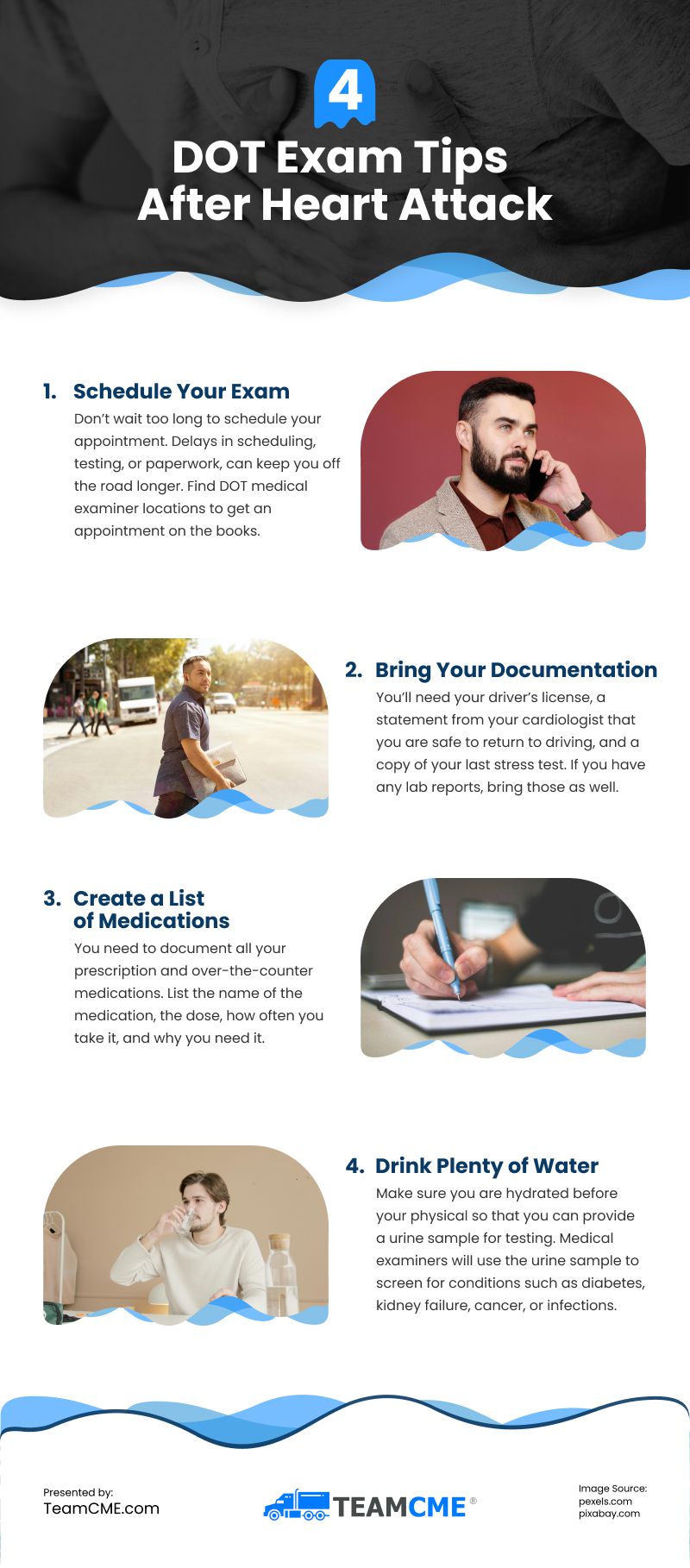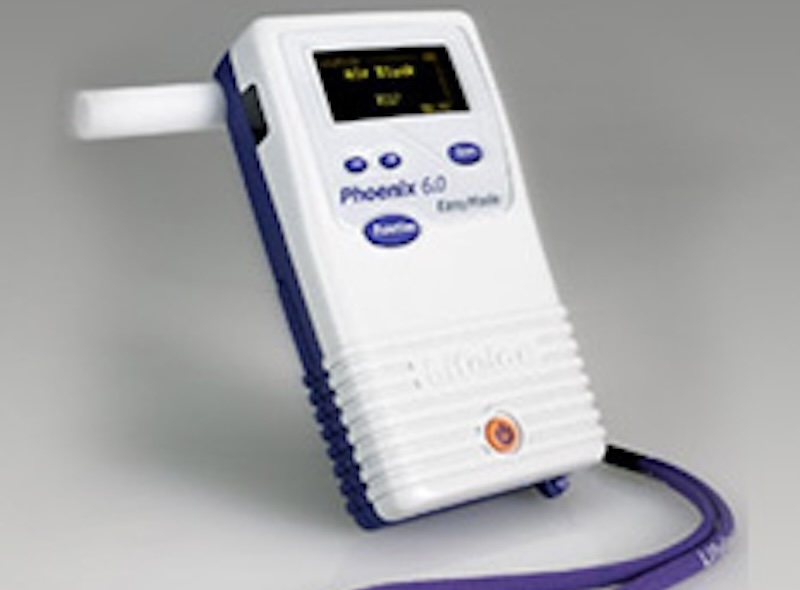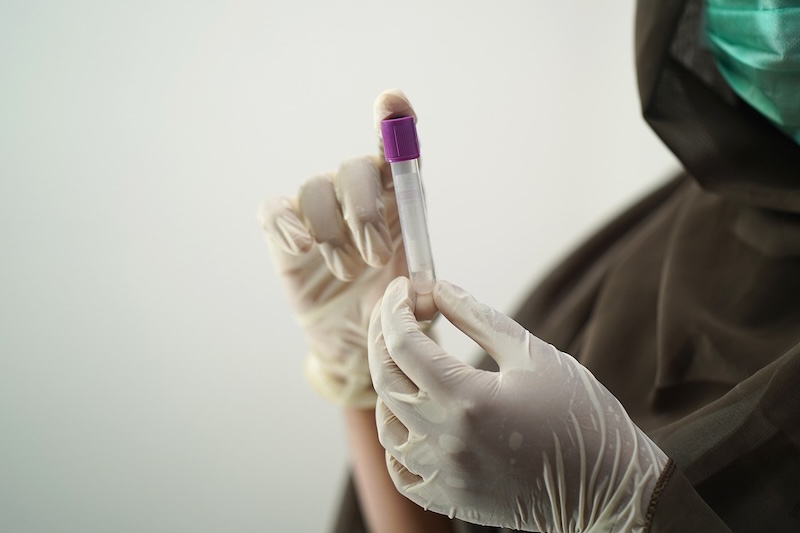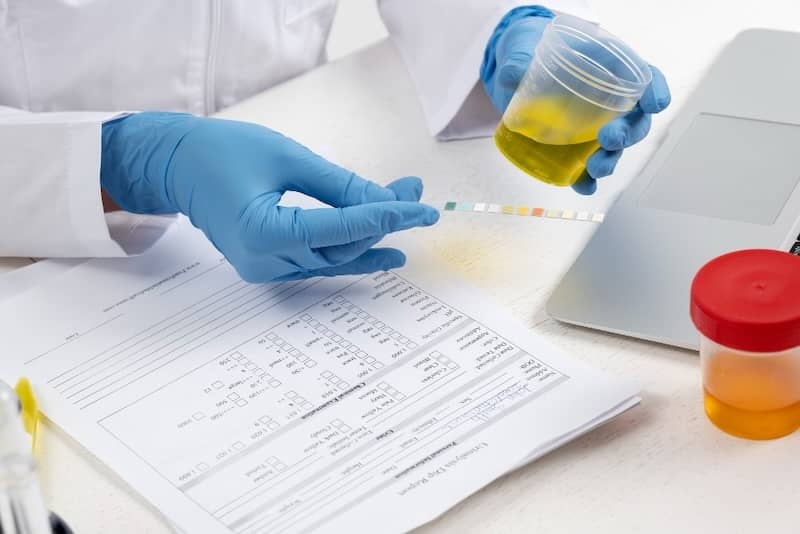It is an unfortunate truth that truck drivers and commercial drivers in the United States are at a significantly higher risk of cardiovascular disease than the general population. If you are a commercial driver and you have a heart condition or have experienced a heart attack, you are probably wondering if you will ever be able to return to driving and what the steps are to do so.
The good news is that with your doctor’s clearance and the appropriate physical evaluations, you can continue to drive after a heart attack. Here are the Department of Transportation guidelines for returning to work and some tips on keeping your heart healthy so you can stay behind the wheel.
What Heart-Related Questions Are in the DOT Physical Exam?
If you have any of the following conditions, you may be prevented from driving until cleared by a cardiologist:
- Chest pains due to narrowed arteries (angina)
- A past heart attack
- A blood clot
- Coronary artery disease
- Previous heart surgery
If you are experiencing any of these conditions, consult your doctor. Your doctor will need to evaluate you, develop a treatment plan, and clear you for work.
What if I Have Experienced a Heart Attack?
If you have had a myocardial infarction, otherwise known as a heart attack, a stent, or open heart surgery, you will need special clearance before you can return to driving. Once you are home from the hospital, the first step is to have your cardiologist clear you in writing.
Before returning to driving, you should obtain a new DOT physical exam. The medical examiner will want to obtain clearance from your cardiologist to verify that you no longer have symptoms consistent with a heart attack or chest pain or any dysfunction of the left ventricle of your heart. They will particularly look at a measurement termed the left ventricular ejection fraction, or LVEF.
Medical examiners should be following “best practices” and many cardiologists recommend an individual obtain an exercise tolerance test (ETT), also known as a stress test, at 4-6 weeks after the heart attack and then every two years thereafter.
How to Prepare for Your DOT Medical Exam
Schedule Your Exam
Don’t wait too long to schedule your appointment. Delays in scheduling, testing, or paperwork, can keep you off the road longer. Find DOT medical examiner locations at TeamCME.com to get an appointment on the books.
Bring Your Documentation
You’ll need your driver’s license, a statement from your cardiologist that you are safe to return to driving, and a copy of your last stress test. If you have any lab reports, bring those as well.
Create a List of Medications
You need to document all your prescription and over-the-counter medications. List the name of the medication, the dose, how often you take it, and why you need it.
Drink Plenty of Water
Make sure you are hydrated before your physical so that you can provide a urine sample for testing. Medical examiners will use the urine sample to screen for conditions such as diabetes, kidney failure, cancer, or infections.
How to Stay Heart-Healthy
While it is possible to return to work following a heart attack or with appropriately managed heart conditions, it would be better to keep your heart as healthy as possible in the first place. Commercial driving can be hard on your health–long hours of sitting, insufficient sleep, and unhealthy eating habits take a toll on your heart. But there are things you can do to help.
Quit Smoking
One out of every three deaths due to heart disease is caused by smoking. Smoking causes plaque to build up in your arteries, constricting blood flow and putting extra stress on your heart. If you feel like you can’t quit cold turkey, try cutting down the number of cigarettes you smoke each day. Every effort you make to cut back will positively impact your heart health.
Move as Much as Possible
We know how hard it is to get exercise when you are on the road for hours each day. But even if you are able to set aside fifteen minutes before you start your day for a walk or some light exercises or do ten minutes of bodyweight exercises when you stop for gas, you will see improvements in your health. Make moderate, regular movement a priority; your heart will thank you.
Get Enough Sleep
Our blood pressure drops when we sleep, giving our hearts a break. When we don’t sleep enough, our blood pressure stays higher for longer, putting undue pressure on our hearts. Set aside enough time for restful sleep, avoid drinking caffeine too close to bedtime, and put away phones and screens an hour before bed.
Eat Healthy
While it is tempting and easy to grab a hot dog from the gas station and stock the truck with packaged snacks, you can eat healthier if you prepare ahead. Try packing things like nuts, fruit, granola bars, and dark chocolate. If you can use a mini-fridge, you can stock yogurt, cheese, and hard-boiled eggs. Use a crockpot to make home-cooked meals while you drive.
Manage Your Stress
Managing your overall stress is good for your health in general, but especially for your heart. Try to incorporate stress-relieving activities each day, like talking to family and friends, spending time outside, practicing meditation, or engaging in calming activities like reading or coloring.
Regular Physicals Will Keep You Healthy and Safe
The DOT requires regular physical exams for commercial drivers, usually every two years. But aside from that, regular checkups are a valuable tool to keep you healthy and safe. A physical may detect a serious medical condition before you start showing symptoms, allowing you to treat it sooner with better outcomes. If you have experienced a heart attack or have a heart condition, you may be required to have a physical more frequently to maintain your CDL.
Where to go for a DOT Physical Exam
Because the regulations for commercial drivers are so involved, the FMCSA requires that DOT exams be performed by certified medical examiners listed on the NRCME. These providers may include providers with a variety of titles, including medical doctors, physician assistants, advanced practice nurses, and chiropractors. Search online for a certified provider near you.
Video

Infographic
Truck and commercial drivers in the US are at higher risk of cardiovascular disease. If you have a heart condition or have had a heart attack, you may wonder about returning to driving. Learn how to prepare for your DOT medical exam in this infographic.







